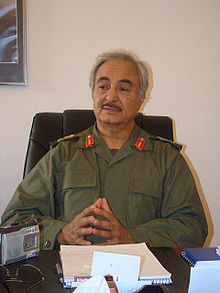By Aimen Majeed and Moutaz Ahmed.

Benghazi, 16 May, 2014:
Benghazi woke up to the sound of heavy gunfire early this . . .[restrict]morning as forces led by General Khalifa Hafter, supported by some members of the air force and marines, attacked the 17 February Brigade, Libya Shield No. 1 (Deraa No. 1) Brigade and Ansar Al-Sharia.
The first two, long linked, are viewed as Islamist. They have recently developed closer ties with the latter.
The action has been in the south west of the city – in Hawari and Sidi Ferej districts, in particular the area controlled by Ansar Al-Sharia between the south-western gate checkpoint and the cement factory – as well as in the port area where clashes were reported between marines and Deraa 1.
Helicopters were seen flying over Hawari.
The action appears to have taken the government by surprise. At a press conference this afternoon, acting Prime Minister Abdullah Al-Thinni who earlier this month called Ansar Al-Sharia a terrorist organisation, insisted that Hafter’s action was illegal and undermined attempts to confront terrorism.
The Chief of Staff, Major General Abdussalam Jadallah Al-Obeidi, has vehemently condemned the attack, calling Hafter’s forces “intruders into Benghazi” and urging “revolutionaries” in the city to resist them.
The assault, codenamed “Libya’s Dignity” by Hafter, is seen as a bid by him to boost his political standing. In February, he provoked bewilderment when he went on TV to announce that he intended to take over power in the country.
A source close to his forces today said that the aim of the operation was to “target and cleanse Benghazi of extremist groups”.
Were to to succeed in doing so, there is little doubt his popularity would soar.
So far, four of his forces are reported to have been killed and 24 wounded. The dead and 16 of the injured were taken to hospital in Marj, from where some of Hafter’s men originated. There are no further details on casualties. Ansar Al-Sharia traditionally have not disclosed their numbers of dead, and 17 February Brigade have done likewise.
Although some air force members and marines are involved, both of which have close links to the Saiqa Special Forces Brigade, it is said not to be involved, neither is the Benghazi Joint Security Room.
A number of flights in and out of the city’s Benina Airport were cancelled or delayed and roads into the city effectively closed.
The operation follows last Friday night’s killing of protestors outside the 17 February Brigade headquarters in Benghazi, after which the brigade was ordered by General Staff to quit the premises. There were then negotiations, but it reportedly refused to do so.
The operation also follows unconfirmed reports that the Chief of Staff, Major General Abdussalam Jadallah Al-Obeidi, was about to dismiss some 400 officers in the east of the country.
Hafter’s forces came from east of Benghazi and are said to include a number of tribal groupings. It is reported that some army forces in Benghazi joined them. There are unconfirmed claims that Ibrahim Jadhran’s Cyrenaica federalist forces also fought alongside them.
Although the BJSR is not involved, its former spokesman Colonel Mohammad Hejazi spoke of Libyan military forces being locked in battle with “terrorist formations” in the districts of Sidi Ferej and Hawari and stated that Libyan “army forces” were now in control of a camp at Rafallah Al-Sahati.
An eyes witness told the Libya Herald that tanks belonging to Saiqa had been stationed on the road in front of its camp at Buatni.
It has called on Benghazi resident to keep away from the areas affected by the fighting, an appeal which people have heeded. With the sound of occasional explosions heard during the afternoon, the streets in the city, even for a Friday, have been largely deserted.
With input from Moutaz Ali in Tripoli [/restrict]







